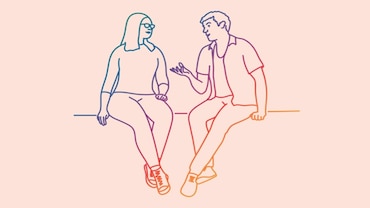- HOME
- /
- Better Living
- /
Ask an Expert: Mehdi Hasan on the Art of Making a Winning Argument
RD spoke to Mehdi Hasan, award-winning journalist and host of the The Mehdi Hasan Show about how to successfully make a point and win it too.
 Shutterstock
Shutterstock
Q: Is winning every argument essential or even possible, or is it about improving our communication skills?
MH: Winning every argument is not essential, of course, but it is certainly possible. Those who say that winning arguments isn’t important tend to be those who have become used to losing them! I believe every single person on the face of the planet—every man, woman, and child—has, at some moment or another, tried to win an argument. These days, we cannot avoid arguments—in public or private! Whether it is in the comments section on our social media platforms, or in the hallways of Congress, or at the dinner table with friends and family, we cannot escape the human urge, need, and—yes—desire to argue. People can study and learn rhetorical skills and techniques handed down by great orators going back to Aristotle and beyond, to improve their everyday communication skills, and they can also deploy them to achieve victory in an argument.
Q: How do you balance the desire to win an argument with the need to maintain a culture of healthy debate that steers clear of outright conflict?
MH: Argument, debate, conflict: these are all loaded terms. And they all tend to get a bad rap. Arguing itself tends to get vilified. It’s blamed for everything from political polarization to marital breakdown. In his 1936 classic, How to Win Friends & Influence People, Dale Carnegie wrote: “I have come to the conclusion that there is only one way under high heaven to get the best of an argument—and that is to avoid it. Avoid it as you would avoid rattlesnakes and earthquakes.” I take issue with Carnegie’s conclusion—if he were still alive, maybe we could debate it!
Argument and debate, when done in good faith, can clarify issues for us; help us reach the truth; and, in fact, resolve our conflicts. I prefer not to avoid arguments. Instead I seek them out, and relish and savour them. I am with the French essayist Joseph Joubert, who is said to have remarked: “It is better to debate a question without settling it than to settle a question without debating it.”
Q: How do you define a successful argument?
MH: Success in an argument may be in the eye of the beholder. Personally, I would define a successful argument as one in which I give enough good reasons; show enough receipts, so that my audience agrees with my conclusion, rather than my opponent’s.
 Journalist and author, Mehdi Hasan
Journalist and author, Mehdi Hasan
Q: At what point can an argument be said to be 'won'? Is it when one has convinced/persuaded the other person to change their mind, or can it also be about clarifying and potentially shifting one's own position?
MH: Context is everything. Are you trying to ‘win’ an argument in public or private? It is being done with or without an audience? If it is the former, and not the latter, then your goal should be to persuade the audience, not the ‘other person’. As for the ‘other person’, again, context matters: are you trying to convince a friend or loved one, or trying to rhetorically vanquish a hostile opponent or adversary? If it is the former, and not the latter, then you might want to be more open-minded, flexible, and be willing to find areas of common ground. Winning, though, requires others to agree with your conclusion.
Q: What are some of your most memorable debates? Ones that affected you fundamentally or one that surprised you?
MH: Debating religion with famed ‘new atheist’ Richard Dawkins; debating Trump with the man who would go on to become his first national security adviser Gen. Michael Flynn; debating Saudi Arabia with the Saudi ambassador to the United Nations inside the Saudi consulate … and surviving to tell the tale!
But one of my most surprising and memorable interviews was with Assad Durrani, the former head of the Pakistani ISI, in front of a live audience at the Oxford Union. I came prepared with multiple tough questions; forensic follow-ups; piles and piles of ‘receipts’ and evidence. And yet none of it was necessary: Durrani was brutally honest and blunt from the get-go. He conceded that Pakistani intelligence services had backed the Taliban; he admitted that home-grown terrorism had been a consequence of Pakistani policy in Afghanistan; he agreed that it was likely the ISI had sheltered Osama Bin Laden in Abbottabad. He had no sense of regret or remorse. And I had no idea where to navigate the interview, given my interviews are premised on my guests trying to duck or dodge my questions!
Q: Your book emphasizes the importance of evidence and facts in making a strong argument. How do you suggest we approach situations where the other person is not receptive to evidence or is actively ignoring facts?
MH: Personally, these are the arguments I tend to avoid. I host a primetime show on American cable news and I invite guests who want to argue and debate. But I have a ‘hygiene test’ on my show: I won’t host conspiracy theorists. I won’t debate election deniers, or Holocaust deniers, or climate deniers. I am a believer in the ‘good-faith argument’, which requires respecting facts and reality. I will not waste my time, or my audience’s, by debating basic reality—up is down, black is white, hot is cold. However, if you are forced into such an exchange, with a person who is ignoring facts, the key is to win over the watching crowd, not the fact-free person. The key is to remind the audience that the other person isn’t interested in facts, reality, or truth.
Q: You also discuss the importance of empathy and active listening in argumentation. How can we balance the need to make a strong case with the need to be open-minded and empathetic towards the other person's point of view?
As I write in my book, there need not be tension between making a strong case and being empathetic and open-minded. Empathy allows us to make a stronger case, by putting ourselves in the shoes of others, by seeing the issue through their eyes, via their arguments. If you want to connect with an audience, in particular, you have to learn to be an empathetic listener. As the famed US secretary of state Dean Rusk once said: “One of the best ways to persuade others is with your ears, by listening to them.”
Q: When or in what situation, in your opinion, is it just not worth arguing?
MH: I don’t argue with those that deny evidence or exclusively deal in conspiracy theories. Also: spouses.
Q: In today's day and age, do you feel people have lost the art of conversation, choosing instead a policy of “get the last word in” or “I don’t know and I don’t care”?
Maybe not in our everyday conversations but certainly our political discussions and debates have been hijacked by Gish gallopers—those bad-faith actors and rhetorical bullies who want to get the first word and the last word; who want to overwhelm us with nonsense and guff; who want to cram as many falsehoods as possible into a short space of time in order to distract, deflect, and disorient. They have corroded and degraded our public squares with a total disregard for facts, truth, or basic etiquette.
Q: Arguments tend to spiral out of control when they’re about things that have a strong emotional connect—fear, insecurity, hate. But emotions, you argue, are powerful persuaders too. How does one tread the line?
The emotional appeal – what Aristotle in his landmark work ‘Rhetoric’ referred to as pathos - is a crucial part of the persuasion equation. You need it, if you’re going to win your argument. But it’s still only a part of the winning recipe. Ultimately, a compelling and emotive story that’s backed up by facts is much more powerful than a threadbare sob story. In short, feelings are what help you get your facts across to your audience. They’re what help listeners retain those facts. And you can ensure that you reach your audience emotionally—by telling stories, using the right language, and knowing when to show emotion yourself. But if it comes down to facts versus feelings, beware: feelings often win. So, don’t let it come down to that unfair fight. Ensure that you have the goods to reach listeners’ hearts as well as their heads.

Mehdi Hasan is a British-American political journalist, broadcaster and author. He present The Mehdi Hasan Show since October 2020. His latest book is Win Every Argument: The Art of Debating, Persuading, and Public Speaking, published by PanMacmillian, 2023.
Head here to read an excerpt from his book!






